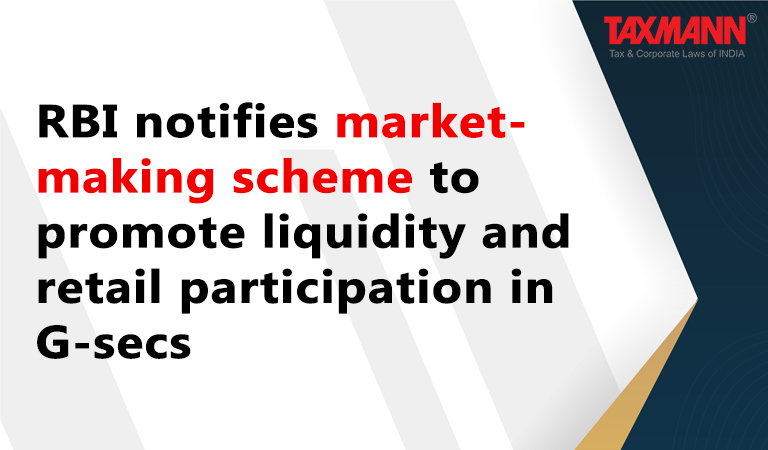RBI notifies market-making scheme to promote liquidity and retail participation in G-secs
- Blog|News|FEMA & Banking|
- 3 Min Read
- By Taxmann
- |
- Last Updated on 6 January, 2022

Circular No. RBI/2021-22/147 IDMD.PDRD.No.S1617/03.64.023/2021-22 04-01-2022
The RBI had launched Retail Direct Scheme on November 12, 2021, for providing one-stop access to facilitate investment in Government Securities by retail investors. In this connection, RBI has notified a market-making arrangement to provide liquidity in the secondary market wherein the Primary Dealers shall be present on the NDS-OM platform (odd-lot and Request for Quotes segments) throughout market hours and respond to buy/sell requests from Retail Direct Gilt Account Holders (RDGAHs). Key Highlights of the scheme is discussed hereunder
1. Important Definitions
“NDS-OM” or Negotiated Dealing Segment – Order Matching means RBI’s screen-based, anonymous electronic order matching system for trading in Government Securities in the secondary market.
“Retail Direct Gilt (RDG) Account” means a gilt account maintained in the books of RBI under the Retail Direct Scheme
Primary Dealers” means entities authorized by RBI to undertake primary dealership activities in Government Securities;
“Request for Quotes (RFQ) segment” refers to the on-screen negotiation system of RBI’s NDS-OM system;
“Government Securities”, for the purpose of this scheme, mean securities issued in form of stock by credit to SGL/CSGL account maintained with RBI as defined under Section 3(iii) of Government Securities Act, 2006;
“Liquid Securities” means security identified and published by Fixed Income Money Market and Derivatives Association of India (FIMMDA)/ Financial Benchmarks India Limited (FBIL) as a ‘liquid security’ for the purpose of short sale transactions.
2. Applicability of retail direct scheme
“Retail Direct Scheme” refers to the RBI Retail Direct scheme formulated to facilitate investment in Government Securities by individual investors. The Scheme is applicable to all primary dealers.
3. The objective of the Scheme
The objective of the Market Making Scheme is to promote retail participation in Government Securities by providing prices/quotes to Retail Direct Gilt (RDG) account holders enabling them to buy/sell securities under the RBI Retail Direct Scheme.
4. Obligations of Primary Dealers
4.1 In the Odd Lot segment
Under the scheme, primary dealers (PDs) may provide buy and sell quotes on the NDS-OM odd lot segment as below:
(a) All PDs may provide buy/sell quotes for liquid securities throughout market hours. Alternatively, the secondary market trading time may be divided into time slots and it shall be ensured that PDs provide buy/sell quotes during these time slots for the liquid securities that they hold. Primary Dealers Association of India may decide on the allocation of time slots amongst PDs and inform the same to IDMD, RBI.
(b) Ds may strive to achieve turnover on the odd-lot segment on a best effort basis.
4.2 In the Request-For-Quotes (RFQ) segment
PDs may be present on the RFQ platform throughout market hours. Any request for buy/sell from the Retail Direct Gilt Account Holders may be responded to by the PDs with a market-relevant quote.
5. Simplified KYC for transactions
Rule 9(14)(i) of the Prevention of Money-Laundering (Maintenance of Records) Rules, 2005, provides for simplified measures to verify the client’s identity. RBI has prescribed that the Primary Dealers shall rely on the Know Your Customer (KYC) verification of the RDG account holders done under the retail direct scheme. No further KYC verification is required for transacting with RDG account holders on the RFQ segment of NDS-OM.
6. Facilities/Incentives for fulfilling the obligations
In order to facilitate switching of securities with RBI, a special Switch window would be opened for Primary Dealers every month, wherein they may switch the illiquid/semi-liquid securities acquired through RFQ segment from RDG account holders with liquid securities from RBI at FBIL/market prices.
Under the scheme, all successful trades under the Retail Direct scheme would be reckoned towards fulfilling the annual target for turnover with mid-segment and retail investors prescribed to each Primary Dealer respectively.
Disclaimer: The content/information published on the website is only for general information of the user and shall not be construed as legal advice. While the Taxmann has exercised reasonable efforts to ensure the veracity of information/content published, Taxmann shall be under no liability in any manner whatsoever for incorrect information, if any.

Taxmann Publications has a dedicated in-house Research & Editorial Team. This team consists of a team of Chartered Accountants, Company Secretaries, and Lawyers. This team works under the guidance and supervision of editor-in-chief Mr Rakesh Bhargava.
The Research and Editorial Team is responsible for developing reliable and accurate content for the readers. The team follows the six-sigma approach to achieve the benchmark of zero error in its publications and research platforms. The team ensures that the following publication guidelines are thoroughly followed while developing the content:
- The statutory material is obtained only from the authorized and reliable sources
- All the latest developments in the judicial and legislative fields are covered
- Prepare the analytical write-ups on current, controversial, and important issues to help the readers to understand the concept and its implications
- Every content published by Taxmann is complete, accurate and lucid
- All evidence-based statements are supported with proper reference to Section, Circular No., Notification No. or citations
- The golden rules of grammar, style and consistency are thoroughly followed
- Font and size that’s easy to read and remain consistent across all imprint and digital publications are applied



 CA | CS | CMA
CA | CS | CMA
